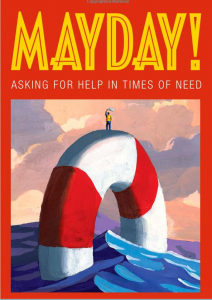Summer is over, September is here, and Rosh Hashanah and Yom
Kippur lie just around the bend.
During this time of preparation for those Days of Awe, our
tradition enjoins us to take a kind of spiritual accounting of ourselves, known
as cheshbon nefesh. We look back upon the year gone by, consider
our failings, and focus our energy on how we can do better in the coming
year.
One of my goals as I enter this sacred season is to learn to
get better at asking for help. I
recently finished reading M. Nora Klaver’s excellent book, “Mayday—Asking for
Help in Times of Need” and have since been reflecting on why most of us find it
so difficult to request assistance. I’ll
be speaking on this topic on Yom Kippur morning and it will also be the subject
of our Yom Kippur study session to follow.
Ms. Klaver describes numerous attitudes and fears that deter
us from turning to others in difficult times.
I’ll share many of these in my sermon.
But I’d also like to include some of your own thoughts on the
topic. So, please, take a moment and
send me a short email, ravdbf@gmail.com, in which you share your musings on the challenge of
asking for help. Let me know what makes
it challenging for you—and how you have managed to overcome the challenges and request
assistance, despite your fears. And if
you have stories of how asking for—and receiving—help made a positive change in
your life, I am very eager to hear them!
I’ll try to weave some of your collective words of wisdom into my Yom
Kippur morning sermon, anonymously, of course.
Meanwhile, may this ongoing month of Elul be a time of
reflection and growth for us all.
L’shanah tovah,
Rabbi Dan

1 comment:
Interesting topic, I think there are actually 3 sides to this. Asking, accepting, and offering. Not asking for help is a very American thing, perhaps a handful of other cultures but we have elevated it to an art form. Being able to accept help is another part, whether it is a graceful acceptance or a reluctant acceptance. The offering of help is another side. Today, I look around and see eyes looking down at the hand, or worse, filming something but not intervening, or offering. Often we know that someone just needs a helping hand, or perhaps a smile but "everyone is too busy". I'm not sure what everyone is too busy doing but I have to wonder if whatever it is, really, truly is so important that they can't spare 30 minutes to offer a hand or an ear or a smile to someone else.
So in not being able to ask for help, we should consider the other side, what if the situation was reversed and someone asked you for help. Even better, you offered to help before that person was put in to the uncomfortable situation of asking. Would you feel hurt if that person said no, I don't want your help? Possibly, or maybe it is an opportunity to see the other side of not asking for help.
I consider it a mitzvah to help others without being asked but I don't ask for help not because of pride but because I'm afraid that the answer is most often "no, I'm too busy".
Post a Comment